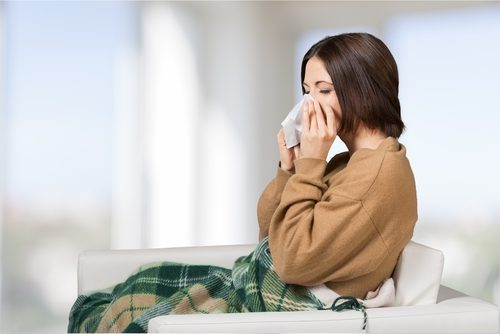
The Centers for Disease Control and Prevention (CDC) estimates that 45% of the U.S. population receives vaccinations during the influenza (flu) season, which helps prevent more than 6 million flu-related illnesses, 3 million medical visits, and 79,000 flu-related hospitalizations.
When is flu season?
The timing is unpredictable and varies by year. Some flu viruses circulate during the summer, and influenza activity often begins increasing in October. The CDC recommends getting vaccinated soon after the vaccine becomes available – in early fall, if possible.
How does the flu spread?
The flu virus enters the body through mucous membranes in the eye, nose, and mouth. It can become airborne when a person coughs or sneezes, making it easy to infect those around you. The virus can also be spread by touching common objects that allow the virus to survive on its surface, then touching your mouth or face.
What are the common signs and symptoms?
| · Fever | · Headache | · Body ache | · Runny or Stuffy Nose |
| · Fatigue | · Chills | · Cough |
The flu may also cause severe complications including sinusitis, bronchitis, and pneumonia. Most people who get the flu usually feel much better within one or two weeks, but some develop complications that can be life-threatening.
How can I protect myself from getting the flu?
- Getting the flu vaccine each year is still the best protection against the flu. Flu vaccines cause antibodies to develop in the body about two weeks after vaccination, providing protection against the viruses that are in the vaccine.
- Any individual who appears to have a flu-like illness should stay home and avoid face-to-face contact with others, unless seeking medical treatment.
- Practice good hygiene by covering coughs and sneezes, washing hands frequently, and cleaning surfaces that are likely to have frequent hand contact.
- Avoid touching your eyes, nose, or mouth to stop the spread of germs.
Many physicians and local pharmacies provide flu vaccinations, and worksite clinics are available for employer groups that meet participation requirements. Your health insurer may be able to coordinate a worksite clinic on your behalf. For more information, contact your health insurer or local pharmacy, or visit flu.gov or cdc.gov/flu.

John E. Aoki, M.D., CHCQM, FABQAURP
Chief Medical Officer
Brought to you by HMAA, where we’re passionate about your health. To find out more about HMAA’s health plans, visit hmaa.com or contact our Customer Service Center. For information about our menu of wellness services, please contact Naomi Azama at (808) 791-7607 or nazama@hmaa.com.





0 Comments